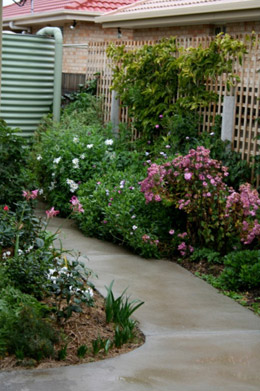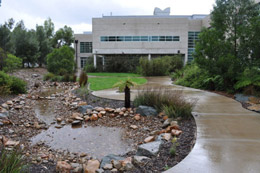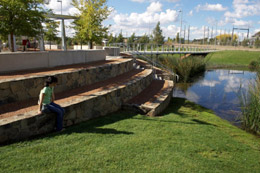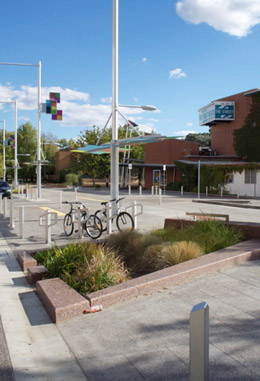ACT State of the Environment Report 2011
Accurate, timely & accessible information for the community regarding the condition of the environment, underlying pressures, and sustainability trends.
Sustainability Story: Water sensitive urban design
Download: Report Stories Water sensitive urban design.pdf
One of the challenges of urban development is dealing with storm water run-off. Sealed surfaces (buildings, roads, pathways, parking areas and the like) shed water rapidly into drains, channels and then into waterways taking with it, precious top soil and damaging pollutants. Water sensitive urban design (WSUD) is about reducing the extent of impervious surfaces and incorporating landscape features and built structures to temporarily store water where it falls and slow its flow into waterways. Good design also helps increases the use of stormwater and treated wastewater and reduces the volume of mains water used.

In WSUD terms, a garden rain water tank is a temporary water storage facility (Photo courtesy of ESD)
Government, industry and the community have all played a role in the move to incorporate WSUD in the ACT. Water efficient buildings have become standard through the use of better fixtures and fittings, or by using different water sources. Most new developments in Canberra now use rainwater, via tank storage, for flushing toilets, in gardens and laundries. Rainwater tanks have become very popular and having them plumbed in appropriately, has increased their efficiency and led to a greater appreciation of water conservation.
Canberra's newest suburbs are now being built with wetlands, ponds, bio-retention facilities and rain-gardens, often integrated as a flood mitigation strategy. Some of these WSUD elements have also been introduced into our older suburbs. They improve urban amenity and, in some places, water for on-site gardens and local playing fields. They also enhance urban biodiversity by creating new aquatic habitats and protecting those downstream. Wetlands and ponds are valued by local residents for recreation and they facilitate educational and volunteering activities by providing a focal point for community life.



Examples of WSUD (From top to bottom) at the UC Innovation Centre, in Kingston and Childers Street, Acton. Photos courtesy of Luke McPhail)
For more information contact the Environment and Sustainable Development Directorate






Share this page: